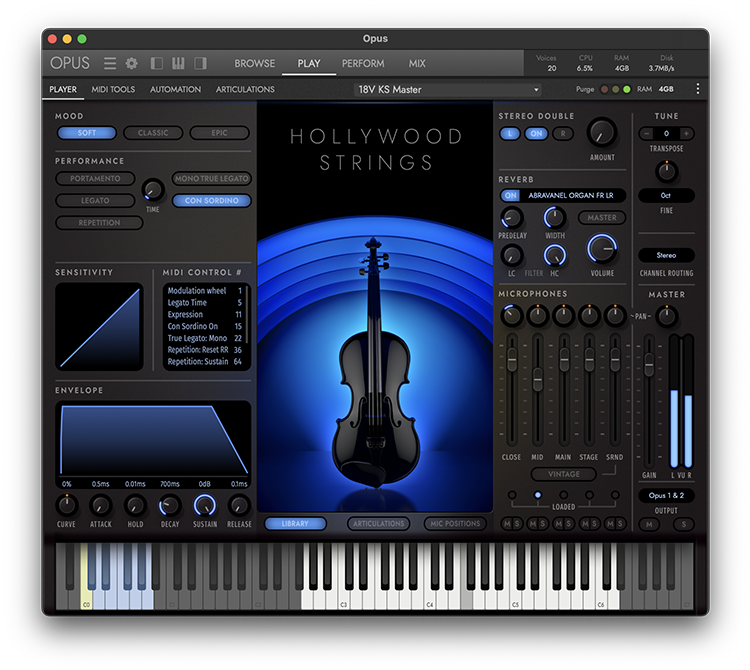
Opus
The Opus software engine replaces Play and has been years in development.
Producer Doug Rogers explains:
Many improvements were made to the Play software engine over the last decade but we suddenly had a unique opportunity, we were able to bring Wolfgang Kundrus in as head of software development. He was the mastermind behind the creation of Cubase, Nuendo, and Studio One. Then we were able to bring in Wolfgang Schneider, the creator of Kontakt. With these two titans of music software development now on our team, we decided it was time to develop a brand new software engine from the ground up.
The Opus software engine is the realization of this effort. Not only is it faster, more powerful, more flexible, and better looking than Play, it comes with incredible new features such as individual instrument auditioning and downloads, customized key-switches, dozens of new MIDI Tools and mixer effects, scalable retina GUI upgrades for legacy products, a powerful new script language, and many more features that allow you to completely customize the sound of each instrument.
It’s one of the most exciting developments in the history of the company and will be the launching pad for many exciting new products in the future.
Below is a brief list of some of the main features of the Opus software engine:
- On-Demand Downloads mean you no longer have to wait hours for large libraries to download. Now instruments can be downloaded individually at the speed of your internet connection. With Audio Previews, audition a sound, download it, and be playing in minutes.
- Fast and Efficient Performance was a top priority as Opus was being developed from the ground up. With an emphasis on achieving the most efficient use of computer resources possible, it is the fastest sample engine on the market. Opus runs natively on Apple’s new M1 processors, and Intel-based Macs, and is compatible with the latest MacOS Monterey and Microsoft Windows 11 operating systems.
- High Resolution User Interfaces are now available for all EastWest product’s in Opus. The high resolution (retina) user interfaces are also scalable to any size, providing ultimate flexibility when used with high-resolution computer monitors.
- A Powerful Scripting Language is an essential part of overall instrument design. It is used to model instrument behavior, implement sonic features not possible to achieve otherwise, and define user interaction. Opus features a brand new, powerful script language called OpusScript developed by Wolfgang Schneider, the creator of Kontakt. It empowers sound designers to express their ideas, and deploy actual functionality and behavior beyond what the underlying software contains.
- Custom Keyswitching allows users to build their own keyswitch instruments, and the ability to create multi-articulation instruments with a variety of options to switch between articulations on the fly. Trigger Options include Keyswitches, Continuous Controllers (CCs), Velocity, Program Changes, and more.
- Advanced Automation options come pre-configured on a per-instrument basis, with custom settings tailored to that instrument or library’s unique features. Users are also free to configure their own automation settings by adding automation parameters and macro parameters, the latter of which controls multiple targets with a single macro. Existing MIDI Controller Mapping assignments can also be re-mapped to any freely available MIDI CC assignment you like.
- Multi-Instrument Setups are easier than ever to manage thanks to a dedicated area of the user interface that handles these ‘Performances’. Use an array of controls and options that allow you to customize how multiple instrument interact with each other, including defining octaves, key ranges, trigger actions, and more.